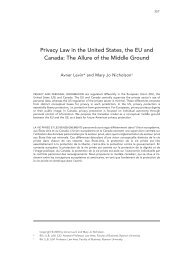Commentary on Fichte's “The Illegality of the Unauthorised ... - uoltj
Commentary on Fichte's “The Illegality of the Unauthorised ... - uoltj
Commentary on Fichte's “The Illegality of the Unauthorised ... - uoltj
You also want an ePaper? Increase the reach of your titles
YUMPU automatically turns print PDFs into web optimized ePapers that Google loves.
(2008) 5:1&2 UOLTJ 141<br />
<str<strong>on</strong>g>Commentary</str<strong>on</strong>g> <strong>on</strong> Fichte 163<br />
necessity, and <strong>the</strong>refore deducible a priori from moral principles. Indeed, Fichte<br />
emphasises that <strong>the</strong> plagiarist is not merely violating a legal right <strong>of</strong> <strong>the</strong> author,<br />
but is in fact acting immorally:<br />
[It has universally] been acknowledged as c<strong>on</strong>temptible to literally transcribe a<br />
work without naming <strong>the</strong> actual author, and we have labelled writers who do this<br />
with <strong>the</strong> dish<strong>on</strong>ourable title <strong>of</strong> plagiarist. This disapproval does not relate to <strong>the</strong><br />
intellectual poverty <strong>of</strong> <strong>the</strong> plagiarist, but to an amoral element in his behaviour. 95<br />
9.2. The Originality <strong>of</strong> Ideas as Explicated in Fichte’s Epistemology<br />
As menti<strong>on</strong>ed earlier, Fichte’s writings <strong>on</strong> epistemology shed light <strong>on</strong> his view<br />
in “Pro<strong>of</strong> <strong>of</strong> <strong>the</strong> <strong>Illegality</strong> <strong>of</strong> <strong>the</strong> <strong>Unauthorised</strong> Reprinting <strong>of</strong> Books” that ideas<br />
bear <strong>the</strong> imprint <strong>of</strong> <strong>the</strong> author’s pers<strong>on</strong>ality. These writings thus elaborate <strong>on</strong> a<br />
point which Fichte makes in passing in his article, namely, that it is <strong>the</strong> pers<strong>on</strong>al<br />
imprint <strong>of</strong> <strong>the</strong> author’s pers<strong>on</strong>ality <strong>on</strong> <strong>the</strong> form she gives to her written work that<br />
grounds her property right in it. As Fichte explains in “Pro<strong>of</strong> <strong>of</strong> <strong>the</strong> <strong>Illegality</strong> <strong>of</strong> <strong>the</strong><br />
<strong>Unauthorised</strong> Reprinting <strong>of</strong> Books,” learning involves <strong>the</strong> processing <strong>of</strong> foreign<br />
thoughts by drawing analogies between <strong>the</strong>se thoughts and our own. But this<br />
process <strong>of</strong> analogising itself entails <strong>the</strong> recogniti<strong>on</strong> <strong>of</strong> <strong>the</strong> impossibility <strong>of</strong> taking<br />
up foreign thoughts precisely as <strong>the</strong>y are presented. In o<strong>the</strong>r words, learning<br />
entails <strong>the</strong> recogniti<strong>on</strong> that a free and rati<strong>on</strong>al being exists outside <strong>of</strong> us up<strong>on</strong><br />
whose freedom we cannot intrude.<br />
Let us look briefly at Fichte’s later epistemology to shed some light<br />
<strong>on</strong> <strong>the</strong> brief asserti<strong>on</strong> in “Pro<strong>of</strong> <strong>of</strong> <strong>the</strong> <strong>Illegality</strong> <strong>of</strong> <strong>the</strong> <strong>Unauthorised</strong> Reprinting<br />
<strong>of</strong> Books” that ideas are <strong>the</strong> unique expressi<strong>on</strong> <strong>of</strong> <strong>the</strong>ir author. It was Fichte’s<br />
view that “[i]t is <strong>the</strong> role <strong>of</strong> critical philosophy to show that we do not require<br />
a bridge [between <strong>the</strong> external and <strong>the</strong> internal]. Everything which appears in<br />
our minds can be completely explained and understood from out <strong>of</strong> <strong>the</strong> mind<br />
itself.” 96 Thus all <strong>of</strong> our knowledge <strong>of</strong> external objects is attributable, not to <strong>the</strong><br />
effects <strong>of</strong> external things <strong>on</strong> us, but to <strong>the</strong> human sensible capacity. For Fichte,<br />
this sensible capacity in turn can be led back to <strong>the</strong> ego, <strong>the</strong> “I,” which itself is<br />
not empirically accessible, but which we can n<strong>on</strong>e<strong>the</strong>less come to know through<br />
intellectual intuiti<strong>on</strong>. 97 We intuit ourselves (our “I”), not separately as a datum <strong>of</strong><br />
empirical c<strong>on</strong>sciousness, but ra<strong>the</strong>r as a necessary comp<strong>on</strong>ent <strong>of</strong> every sensible<br />
intuiti<strong>on</strong>. In Fichte’s words:<br />
[T]he philosopher discovers [. . .] intellectual intuiti<strong>on</strong> as a fact <strong>of</strong> c<strong>on</strong>sciousness.<br />
(It is a fact for him; for <strong>the</strong> original I it is an Act.) He does not, however, discover<br />
it immediately, as an isolated fact within his c<strong>on</strong>sciousness, but <strong>on</strong>ly ins<strong>of</strong>ar as he<br />
95. Fichte, “Pro<strong>of</strong> <strong>of</strong> <strong>the</strong> <strong>Illegality</strong> <strong>of</strong> <strong>the</strong> Reproducti<strong>on</strong> <strong>of</strong> Books,” supra note 2 at para. 11 (emphasis added).<br />
96. Johann Gottlieb Fichte, “Recensi<strong>on</strong> des Aenesidemus oder über die Fundament der vom Herrn Pr<strong>of</strong>.<br />
Reinhold in Jena gelieferten Elementar-philosophie,” in Immanuel Hermann Fichte, ed., Johann Gottlieb<br />
Fichtes sämmtliche Werke (Veit & Comp., 1845/6); reprinted in Immanuel Hermann Fichte, ed., Fichtes<br />
Werke, vol. 1 (Walter de Gruyter & Co., 1971) at p. 15, quoted in Rohs, Johann Gottlieb Fichte, supra note<br />
28 at pp. 43–44 (author’s translati<strong>on</strong>).<br />
97. Johann Gottlieb Fichte, “Sec<strong>on</strong>d Introducti<strong>on</strong> to <strong>the</strong> Wissenschaftslehre. For Readers Who Have a<br />
Philosophical System <strong>of</strong> Their Own,” in Daniel Breazeale, ed. and trans., Introducti<strong>on</strong>s to <strong>the</strong><br />
Wissenschaftslehre and o<strong>the</strong>r Writings (Hackett, 1994) 36–105 at p. 44.









